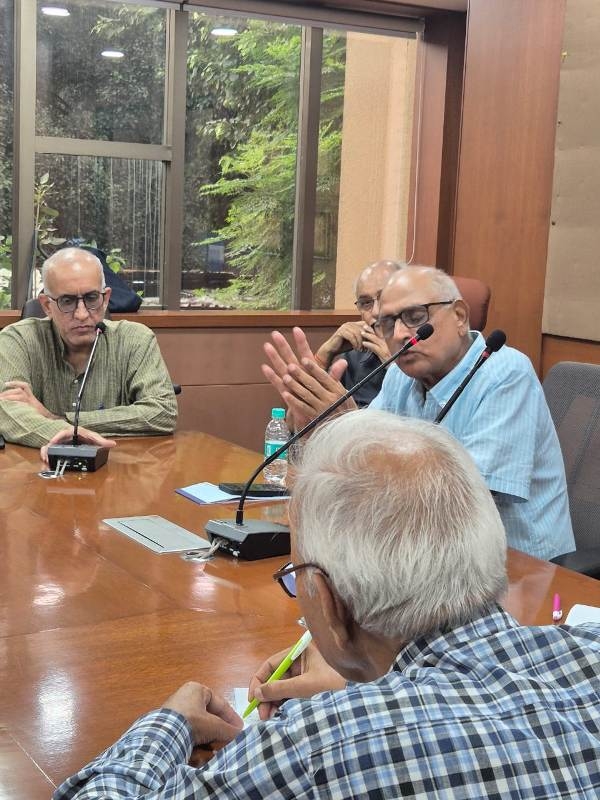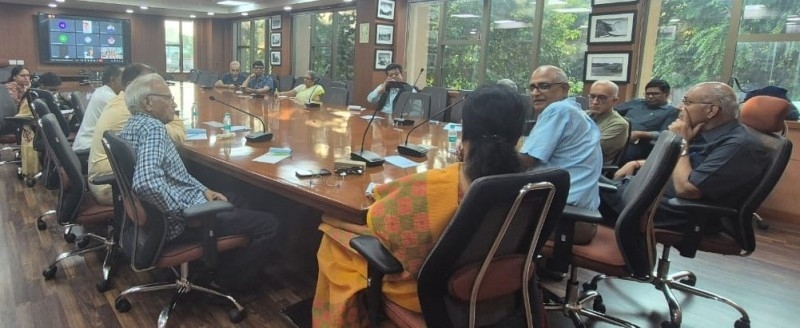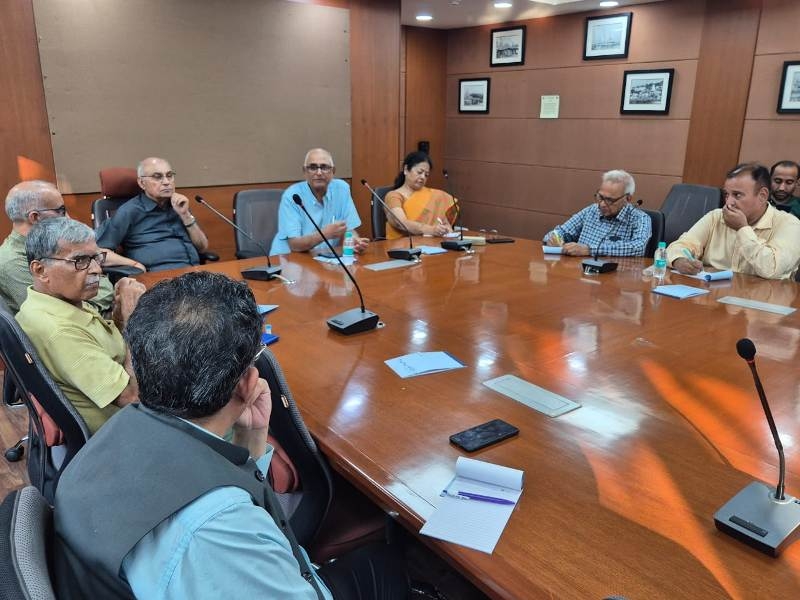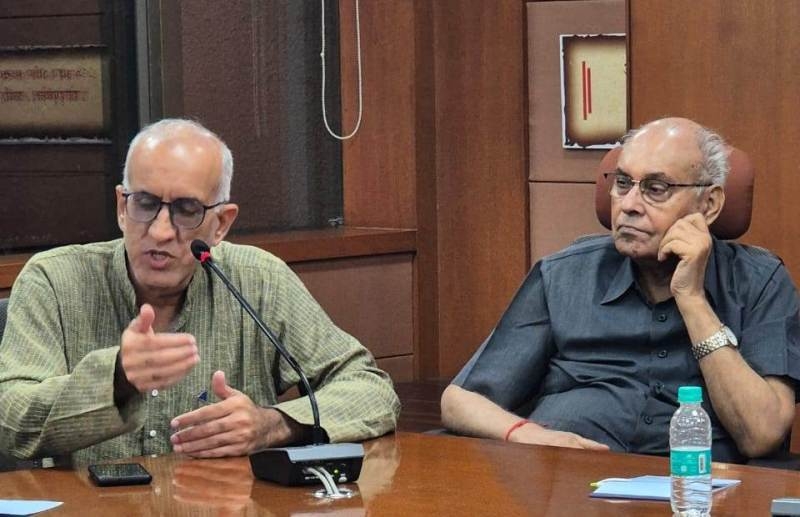Round Table Discussion on “Caste and Census in India”
Total Views |
Round Table Discussion on “Caste and Census in India”
September 26, 2024
The issue of caste in India has deep historical roots and continues to play a significant role in various aspects of society, politics and economics. To understand the importance and relevance of caste and the ongoing debate on caste census in India, a round table discussion was organised by India Policy Foundation on September 26, 2024 in New Delhi. The keynote address was delivered by Dr. J.K. Bajaj, founding trustee and director of the Centre for Policy Studies, Chennai. The session was chaired by Prof. Sheila Rai, Chairperson, India Policy Foundation in the presence of Dr Mahesh Chandra Sharma, Chairman of the Research and Development Foundation for Integral Humanism. The event was attended by several experts who shared their perspectives on how caste influences contemporary India, particularly in the context of census and policy-making. The discussion was moderated by Dr Kuldeep Ratnoo, Director, India Policy Foundation. This report summarises their views and provides insight into the ongoing debate around caste and the importance of a caste-based census.

In his introductory remarks, Dr. J.K. Bajaj explained in detail about age-old relevance of caste in Indian society, particularly within the Hindu framework. He recollected how certain castes have historically contributed to technological advancements as they specialised in specific skills like steel-making, craftsmenship, and masonry. He argued that if these skills had been integrated into the modern education system, India could have preserved and advanced these traditional crafts.
The second important point made by Dr Bajaj was that the caste system in its original form was not vertically hierarchical but horizontally differentiated. He pointed out that ancient scriptures and texts like the Mahabharata, suggest that no caste was superior or inferior to another. He pointed out to how earlier masons name used to be proudly displayed in front of a building and due credit was always given to them. However, with the advent of Muslim rule and later with British colonisation, a vertical hierarchy was imposed on the caste structure, resulting in socio-economic stratification. He cited examples from ancient times with even the Mahabharat having germinated from a promise that a powerful King Shanthanu had to give to a fisherman, the community now categorised as backward.

He said it was unfortunate that when we talk about the caste discrimination, we say that it is millennia old problem. He pointed out that this is not the case as the divisions within castes became stark only after the Britishers came to India. The evidence of the divisions that they have created in the Indian society can be understood when we take into account how majority of the kings of that era were from communities that are now considered backwards.
He noted that the First Backward Class Commission, Kaka Kalelkar Commission was set up by a Presidential Order under Article 340 of the Constitution of India in 1953. He also highlighted constitutional provisions made for Scheduled Castes under Article 341. Though the Kaka Kalelkar report was not accepted by the central government, it paved the way for the state governments formulating their own policies for backward classes. So, when the Mandal Commission was appointed in 1979 by the Janata Party government, in which Jan Sangh was a part, many states had prepared a list of backward castes. But it was only after the report was accepted by the V.P. Singh government, then supported by BJP, in 1990 that caste-based politics gained momentum. In 1993, the Other Backward Classes (OBC) as a category came into existence. Since then, representation from OBCs in institutions such as IITs, IIMs, and civil services has significantly increased, contributing positively to nation-building. In 2017, the Rohini Commission was appointed by the BJP government to understand the sub-categorisation of OBCs. Dr Bajaj noted that the policies made even before independence to address the issue of caste has had a huge impact on Indian society.
He urged that India should be proud of how far it has come. When compared to America where Blacks had to fight one of the bloodiest civil wars in the world to be released from slavery and the discrimination still persists in the American society, in India, people belonging to backward castes are in a better position.

Dr Bajaj strongly advocated for the need for a caste census to gather comprehensive data on education, employment, and income within caste groups. He argued that such data is essential for assessing the effectiveness of affirmative action policies and for understanding the true extent of progress within various communities. He emphasised that there must be sub classification to make the welfare programs and affirmative action more effective.
He added, “Independent India’s first detailed census took place in 1961, but caste data was not included, influenced by socialist ideals of the time. Today, with 50 per cent of reservations being caste-based, the need for accurate data is more pressing than ever.” He stressed that without proper data, it is difficult to measure India’s progress or determine how inclusive its growth has been. He argued that “data brings peace” as it will give a better understanding of the development that has taken place in each area.
Furthermore, Dr Bajaj also pointed to challenges in conducting a caste census, particularly the complexity of identifying and coding castes. Giving the example of the 2011 Socio Economic and Caste Census, he said many castes have multiple names which makes accurate classification difficult. He cited Karnataka as a state that successfully compiled a coded list of castes five years ago, suggesting that other states can emulate this process.
In an intervention, Shri Durga Nand Jha, Author of the ‘Integral Social Development Report’ argued that more than caste divisions, we should address the rural-urban divide as those living in urban areas, irrespective of castes have better access to facilities.
Dr Sheila Rai, in her remarks, offered a broader critique of how caste-based policies have shaped Indian society. She emphasised that while the Indian Constitution is silent on castes, it talks about classes and most policies have been framed around caste. This creates an inherent contradiction and has led to divisiveness in society, particularly after the implementation of the Mandal Commission’s recommendations.

Dr Sheila Rai pointed out that in states like Bihar, many people stopped using caste-identifying surnames in a bid to reduce caste-based acrimony. However, she acknowledged that conducting a caste census is a necessary but arduous ask. The challenge lies in ensuring that such a census doesn’t deepen existing divisions in society.
Dr Kuldeep Ratnoo emphasised that caste has historically been profession-based. In the past, certain castes dominated professions that were not lucrative, but today, with changing economic conditions, those same professions are in high demand. He pointed out that hygiene was a major factor in stratification of castes as those who were dealing with professions that involved dead animals and their hides were usually asked to stay away from others in the fear of spreading diseases. However, with technological advances and new skills being developed and valued, there is a shift in societal perceptions.
Dr Ratnoo underscored the importance of collecting data to better understand the internal divisions within castes and how they evolve with time. “Only with accurate data can the government design policies that address these divisions and promote societal harmony,” he added.

The debate on caste and census in India is complex and multifaceted. While caste continues to be an important marker of identity and profession in India, there is growing recognition of the need for data to assess the true socio-economic conditions of different caste groups. The call for a caste census, supported by experts like Dr J.K. Bajaj is rooted in the belief that without this data, meaningful progress in addressing caste-based inequalities cannot be achieved. At the same time, concerns remain about the potential divisiveness that a caste census could foster. Nevertheless, the consensus is that accurate and comprehensive data is necessary to inform public policy and ensure that India’s growth is inclusive.

